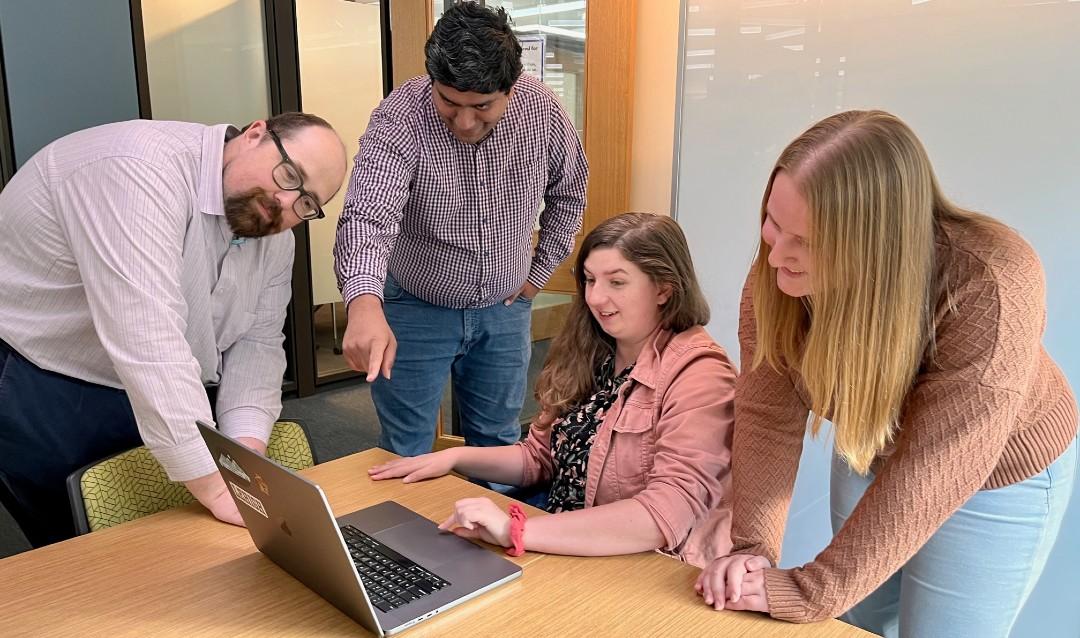The Mountaintop Summer Experience project team "STEM Visualizations" is developing an online simulator aimed at enhancing the engineering lab experience and increasing students’ capacity to study and analyze complex systems.
Unlike a traditional passive classroom setup, the simulator offers students an engaging visual and interactive way to understand the intricate relationships among various parameters more comprehensively.
Srinivas Rangarajan, an associate professor of chemical and biomolecular engineering and the project’s primary mentor, spoke to the transformative impact of “numerical experimentation.” This approach allows students to use the online simulator to scrutinize their experimental designs comprehensively, thereby speeding up the time it takes to model and prove engineering hypotheses.
“The online simulator empowers students to optimize their experiments, enabling them to test multiple scenarios and assess the influence of various parameters,” Rangarajan said.
Rangarajan also highlighted the varied backgrounds of the 2023 Mountaintop team members, underscoring the uniqueness of each student's learning journey and pace.
The efforts of the STEM Visualizations team manifest the Lehigh User Designed Inquiry (LUDI) that is part of Lehigh’s strategic plan. The team’s work is a tangible representation of the university's focus on educational innovation, emphasizing the importance of fostering meaningful inquiry using a variety of pedagogical approaches.
"LUDI forms a cornerstone of Lehigh's evolving teaching methodology,” said William Gaudelli, dean of the College of Education and vice provost for innovation. “At its heart, LUDI offers students diverse paths through content, granting them agency and choice in their learning journey. Whether through text, visuals, audio or immersive experiences, providing varied modalities enriches engagement and sharpens self-awareness as learners."
Khanjan Mehta, vice provost for Creative Inquiry, said that exploring the Susceptible-Exposed-Infected-Recovered model developed by the STEM Visualization team is a thrilling journey for engineering educators.
“What I find truly exciting about this model is its ability to transport students right into the epicenter of infectious scenarios, allowing them to witness firsthand the intricate dynamics of disease transmission,” Mehta said. “This tool (the online simulator) is more than an educational aid; it's an experience, enabling a deeper, interactive engagement with subject matter. It aligns with human cognitive preferences, making learning complex systems a visually enriching and exciting adventure, deeply anchored in sound educational principles.”
The current STEM Visualizations team consists of four students: Madeline Judd '25, a computer science major; Alex Pellett, '23' 24G, majoring in biological chemical engineering; Tyreese Davidson '26, studying computer science and business, and Alicia Zhang '25, a finance major.
They are developing their current module, the Digital Lab Twin (DLT), for Joseph Menicucci, associate chair and associate professor of chemical and biomolecular engineering, to use in his Chemical Engineering Lab II course set for Spring 2024. DLT, which focuses on photobioreactors, offers students a platform to efficiently interact with and modify many parameters within a simulated environment. Essentially, the DLT emulates conditions of physical lab experiments in a digital realm.
Judd said many classrooms still rely on the traditional lecture format, where professors teach and students primarily take notes, without effectively integrating technology.
"The 'one size fits all' approach no longer suits contemporary education. Students originate from diverse backgrounds, have unique needs and possess different learning styles," said Judd. "Our digital module, which is anticipated to transform the current teaching model, serves as a response to this deficiency."
The strides taken by the STEM Visualization project team epitomize the refined vision of UDI at Lehigh.
"Crafting curricula that harmonize with students' intrinsic drives, encouraging multifaceted exploration, and aligning evaluations with real-world contexts, elevates not just scholarly pursuits but the holistic evolution of the student,” Gaudelli said. “This embodies the very ethos of our university's mission."
Menicucci, who also serves as the project's co-mentor, is optimistic about integrating the DLT in his Chemical Engineering Lab II class. He emphasized that the DLT will enable students to conduct and optimize experiments with efficiency, providing real-time, prompt results.
"In a traditional lab, adjusting parameters, like the initial cell concentration, might take months to see the impact, and results aren't always as expected," Menicucci said. "With DLT, students can predict outcomes and then experiment, making their approach more strategic and increasing the chances of obtaining meaningful data."
He added, "A unique feature of the digital twin module is its learning ability. As it absorbs data from student experiments, the module refines its models, improving and evolving over time. This feature enables students to test hypotheses before conducting real-life experiments."
Discussing the project's future, the team has submitted a paper to the American Society for Engineering Education (ASEE) that aims to expand the module's influence beyond Lehigh, applying it to other universities and even high schools.
By Haidan Hu





